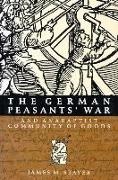Mehr lesen
James Stayer argues that Anabaptist community of goods continued the popular radicalism of the early Reformation and the Peasants' War of 1525. During the German Reformation hundreds of thousands of commoners were mobilized by the hope that established clerical and aristocratic order could be replaced by justice and equity based on the divine law of the Bible. After the defeat of the commoners in the Peasants' War, some of the most ardent adherents of social and religious reform attempted to achieve these same aspirations by trying to implement the apostolic model of Acts 2 and 4 through the Anabaptists. Thus, as Stayer reveals, the Peasants' War was an essential formative experience for many of the original leaders of Anabaptism.
Inhaltsverzeichnis
Part 1 The peasants' war - three essays: the Peasants' war seen through the prism of current historiography; the radicalization of the social gospel of the reformation; Anabaptists and future anabaptists in the peasants' war. Part 2 Anabaptist community of goods: the Swiss brethren and acts 4 - a rule of sharing and a rule against exploitation; the anti-materialistic piety of Thomas Muntzer and its anabaptist expressions; Anabaptist Munster, 1534-1535: the war communism of the notables; Anabaptist Moravia, 1520-1622: communitarian christianity in one country.
Über den Autor / die Autorin
James M. Stayer is Professor of History, Queen's University.

